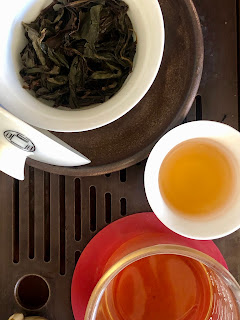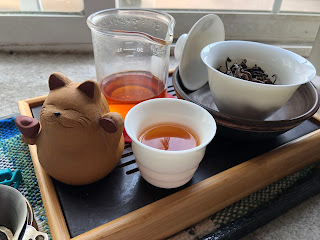Tea Tasting: Shihmen Tie Guan Yin "Stone Gate" Oolong Tea
 For this tea tasting, I chose a Shihmen Tie Guan Yin. Why? Because it's May 1st, it's warm & beautiful outside, and I associate Taiwanese teas with spring. Also, I absolutely love trying new teas that are unusual, rare, or some other characteristic that makes it "different" from other teas, and this one fits the bill very well.
For this tea tasting, I chose a Shihmen Tie Guan Yin. Why? Because it's May 1st, it's warm & beautiful outside, and I associate Taiwanese teas with spring. Also, I absolutely love trying new teas that are unusual, rare, or some other characteristic that makes it "different" from other teas, and this one fits the bill very well. When I was looking through the 2020 harvest of tea from Taiwan Sourcing, this description caught my eye.
This region, Shihmen, is now a fading legend of tea.... First thing you will notice from this tea is the pungent Jackfruit aroma from the boiled water, then after that you will be soaked into its only-found-in-Shihmen taste and body feeling no where else can offer. (See below for full description)
I realize that many tea vendors might hype up their descriptions for selling, but I was definitely very curious about this tea. One of the owners, "Old Dog" called it a "unicorn tea", and had to be somewhat convinced to sell it.
It was a bit expensive to purchase, but I had the budget for it.
Taiwan Sourcing vacuum packs their tea, so I had put it away for a while to let it mellow, and when it was time to do this particular session, I was torn between this tea and another "unusual" tea from them.
Tea Session
- Teaware: 110 ml Gaiwan
- Water Amount: ~ 100ml
- Tea Amount: 5.14 grams
- Brewing Temperatures: 200+
- Time (seconds): 10, 20, 30, ??, 90
- High notes of the aroma: The lid of the gaiwan smells of ripe fruit....specifically jackfruit
- Low notes of the aroma: The leaves in the gaiwan smell of cooked fruit with an underlying sweetness.
- Broth:
- 1st Infusion: (10 sec). I am pleasantly surprised at the viscocity of this tea even with such a short steep duration. It's thick, rich, and very jackfruity. The leaves are perhaps 40-50% open at this point. There's no astringency
- 2nd: (20sec): The broth definitely has a jackfruit taste. It's very viscous & thick almost to the point of syrupy, and coats the tongue. I can feel this tea at the back of the throat with a negligible amount of astringency. There's no bitterness
- 3rd: (30 sec). I notice that the highs & lows from the gaiwan are starting to diminish slightly. The leaves are almost open as well. I hope that this is not a short-lived tea just from the scents. But, luckily, the broth is still going strong. It's not as viscous as #1-#2, but still fairly viscous. I might increase the steep time a bit more. I do notice a slight increase in astringency at the back of my throat
- 4th: (??) I left this steep for some time. The highnotes of the leaves are barely there, but the low notes still smell faintly of cooked fruit. The broth is not as viscous as the first few, but still pretty thick. The flavors are definitely starting to diminish. The leaves are very nearly completely open.
- 5th: 90 seconds: This is definitely starting to give out although there's still quite a bit of flavor. I'm going to throw it into a tall glass and brew it grandpa style.
Summary
Tea Information
- Origin: Shihmen, Taiwan
- Type: Tieguanyin
- Leaf shape: strips
- Cost: $2.36 per gram
Read the entire description from Taiwan Sourcing. [1]
This region, Shihmen, is now a fading legend of tea. When we arrived to meet Mrs. Xie, an elegant and tender lady in her 70s, we found a small town with not much tea left. Sure, there were lots of Jin Xuan varietal that was introduced by the Farmer's Association over decades ago, but this is not what make Shihmen a unique role in Taiwanese tea culture.Shihmen is the northmost place that grows tea in Taiwan, and famous for a varietal called "Hard Twig Red Heart." Although bearing the same term "red heart" in its name like the Tie Guan Yin varietal called "Red Heart Twisted Tail Peach"(紅心歪尾桃), this varietal is completely different from it. This factor became quite noticeable after several hours into the indoor withering. We noticed it bearing very similar characteristics as "#21 Rhythm" does, which is a varietal for creating black tea such as this "Nectar Melody" This characteristics made us to change the processing ideology accordingly to fit its original footprint.We finished the tea without surprise as the sunlight began to beam from the coast. Not surprisingly the quantity of final production is extremely small, however the result is beyond expectation as the offspring of grandma Xie tasted the tea grown by their elder with awe. "This is actually quite delicious" The daughter of Mrs. Xie said to us. She was reluctant to give it a try, but now she is convinced.
This "Stone Gate" oolong we made has some traits of wild tea despite being managed by grandma Xie. First thing you will notice from this tea is the pungent Jackfruit aroma from the boiled water, then after that you will be soaked into its only-found-in-Shihmen taste and body feeling no where else can offer. We truly hope the tea industry in Shihmen could be revived, and we hope this wonder we created will be that first attempt to make people notice this wonderful place in Taiwan again just like "the Harbor."
If you are interested in how the "Stone Gate" was processing, please visit our Youtube channel to find out. Click here!
- Harvest: Spring 2020 / 春 貳零貳零
- Varietal: Red Tig Red Heart / 硬枝紅心
- Elevation: 100 M / 壹佰 公尺
- Region: Shihmen / 石門
- Oxidation Level: 45% / 分之 肆拾伍
- Roast Level: 3 / 參 分




Comments
Post a Comment